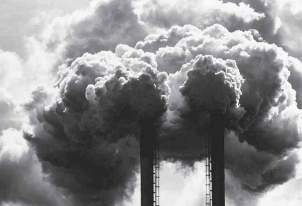|
Lying Nations -- Carbon Emissions HIGHEST on Record
by staff report via snowy - CBC Tuesday, Dec 6 2011, 5:23am
international /
environment /
other press
Runaway Global Warming Today's Reality
Forget tipping point (exceeded years back) the latest stats indicate that no nation has been forthright regarding Carbon reduction programs nor will they ever be; the hard reality of short term expediency has overwhelmed the imperative of long term SURVIVAL -- an unfortunate/insane reality but REALITY nevertheless. All national/local ETS and Carbon Tax programs are now a misplaced policy joke an unnecessary tax burden. Carbon emissions are a GLOBAL problem that require a GLOBAL SOLUTION!

Global carbon dioxide emissions hit a record 9.1 billion tonnes in 2010, after a year of the highest growth ever, a new study has found.
"This is the highest total annual growth recorded, and the highest annual growth rate since 2003," reported an analysis by the Global Carbon Project published Sunday in the journal Nature Climate Change. The project is an international science research partnership founded in 2001 to develop a complete picture of the global carbon cycle.
Emissions of greenhouses gases, measured in units equivalent to tonnes of carbon dioxide, have been linked to global climate change.
The new study was released as world leaders meet in Durban, South Africa, in an effort to reach a new international agreement to reduce emissions and tackle climate change following the end of the commitment period for the Kyoto Protocol, and the failure to reach a new binding agreement in Copenhagen in 2009.
Governments are aiming to keep the increase in global temperatures by 2100 below two degrees. The Intergovernmental Panel on Climate Change suggests that may allow the world to avoid some of the most dangerous aspects of climate change, such as a significant rise in sea level and extreme weather.
However, the new analysis shows global emissions since 2000 are on track to "far exceed two degrees warming by 2100," said study co-author Corinne Le Quéré, director of the Tyndall Centre for Climate Change Research at the University of East Anglia, in a statement.
Preliminary estimates showed the 2010 emissions increase was driven by a 5.9 per cent jump in fossil fuel emissions after the world economy rebounded from the 2008-09 financial crisis, said the study led by Glen Peters of the Center for International Climate and Environmental Research in Oslo, Norway. That "more than offset" the 1.4 per cent drop in emissions in 2009 as a result of the crisis.
For the past two years, the study said, the growth in emissions has been dominated by developing countries, the study found, especially China, where emissions grew by 212 million tonnes or 10.4 per cent, and India, where emissions grew 49 million tonnes or 9.4 per cent last year.
Average emissions drop developed countries
In 2010, CO2 emissions in developed countries grew 3.4 per cent. But after decreases in the two previous years, they are now lower than the average emissions during 2000 to 2007.
The study suggested that the global financial crisis helped developed countries meet their emissions commitments under the Kyoto Protocol and Copenhagen Accord, but had little impact on emissions growth in the developing world.
"Reversing the growth in global fossil-fuel and industrial CO2 emissions will require countering the trends in all of the underlying contributors," the paper said.
Overall, global carbon dioxide emissions from burning fossil fuels have increased 49 per cent in the past two decades, the study said.
While previous economic crises since the 1960s had persistent effects on energy production and consumption, that was not the case for the 2008-09 crisis. The study suggested that was due to a fast drop in energy prices, large government investments to stimulate the economy, and high economic growth in the developing world.
Although the global financial crisis "was an opportunity to reverse some of the trends leading to increased CO2 emissions, the return to high emissions growth in 2010 may make the global financial crisis a lost opportunity," the paper said.
© CBC 2011
From the NYT:
Carbon Emissions Show Biggest Jump Ever Recorded
by Justin Gillis
Global emissions of carbon dioxide from fossil-fuel burning jumped by the largest amount on record last year, upending the notion that the brief decline during the recession might persist through the recovery.
Emissions rose [a staggering] 5.9 percent in 2010, according to an analysis released Sunday by the Global Carbon Project, an international collaboration of scientists tracking the numbers. Scientists with the group said the increase, a half-billion extra tons of carbon pumped into the air, was almost certainly the largest absolute jump in any year since the Industrial Revolution, and the largest percentage increase since 2003.
The increase solidified a trend of ever-rising emissions that scientists fear will make it difficult, if not impossible, to forestall severe climate change in coming decades.
The researchers said the high growth rate reflected a bounce-back from the 1.4 percent drop in emissions in 2009, the year the recession had its biggest impact.
They do not expect the extraordinary growth to persist, but do expect emissions to return to something closer to the 3 percent yearly growth of the last decade, still a worrisome figure that signifies little progress in limiting greenhouse gases. The growth rate in the 1990s was closer to 1 percent yearly.
The combustion of coal represented more than half of the growth in emissions, the report found.
In the United States, emissions dropped by a remarkable 7 percent in the recession year of 2009, but rose by just over 4 percent last year, the new analysis shows. This country is the world’s second-largest emitter of greenhouse gases, pumping 1.5 billion tons of carbon into the atmosphere last year.
The United States was surpassed several years ago by China, where emissions grew 10.4 percent in 2010, with that country injecting 2.2 billion tons of carbon into the atmosphere. Carbon dioxide emissions are usually measured by the weight of carbon they contain.
The new figures come as delegates from 191 countries meet in Durban, South Africa, for yet another negotiating session in a global control effort that has been going on, with minimal success, for the better part of two decades.
“Each year that emissions go up, there’s another year of negotiations, another year of indecision,” said Glen P. Peters, a researcher at the Center for International Climate and Environmental Research in Oslo and a leader of the group that produced the new analysis. “There’s no evidence that this trajectory we’ve been following the last 10 years is going to change.”
Scientists say the rapid growth of emissions is warming the Earth, threatening the ecology and putting human welfare at long-term risk. But their increasingly urgent pleas that society find a way to limit emissions have met sharp political resistance in many countries, including the United States, because doing so would entail higher energy costs.
The new figures show a continuation of a trend in which developing countries, including China and India, have surpassed the wealthy countries in their overall greenhouse emissions. In 2010, the combustion of fossil fuels and the production of cement sent more than nine billion tons of carbon into the atmosphere, the new analysis found, with 57 percent of that coming from developing countries.
Emissions per person, though, are still sharply higher in the wealthy countries, and those countries have been emitting greenhouse gases far longer, so they account for the bulk of the excess gases in the atmosphere. The level of carbon dioxide, the main such gas, has increased 40 percent since the Industrial Revolution.
On the surface, the figures of recent years suggest that wealthy countries have made headway in stabilizing their emissions. But Dr. Peters pointed out that in a sense, the rich countries have simply exported some of them.
The fast rise in developing countries has been caused to a large extent by the growth of energy-intensive manufacturing industries that make goods that rich countries import. “All that has changed is the location in which the emissions are being produced,” Dr. Peters said.
Many countries, as part of their response to the economic crisis, invested billions in programs designed to make their energy systems greener. While it is possible those will pay long-term dividends, the new numbers suggest they have had little effect so far.
The financial crisis “was an opportunity to move the global economy away from a high-emissions trajectory,” said a scientific paper about the new figures, released online on Sunday by the journal Nature Climate Change. “Our results provide no indication of this happening.”
© 2011 The New York Times Company
[What it all means is that small nations that foolishly (or obediently, Gillard's/G Sachs Australia) IMPOSE a Carbon Tax/ETS on the population do so in the full knowledge that the policy will have no appreciable effect on Global Carbon emissions or runaway CLIMATE change -- that is the HARD REALITY and ANYONE that says otherwise is a reprehensible LIAR! Are YOU reading this Juliar 'G Sachs Carbon' Gillard, the Corporatist Banker whore of Australia?]
http://tinyurl.com/7v6qf2p

Oz PM, Juliar Gillard
http://www.cbc.ca/news/technology/story/2011/12/05/environment-co2-emissions-record.html
<< back to stories
|